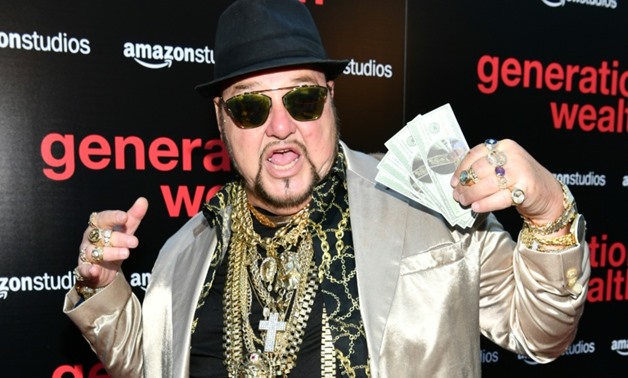
Limo Bob, a character in "Generation Wealth" for whom the word "bling" could have been invented, is seen at the film's premiere.
Award-winning photographer and filmmaker Lauren Greenfield has spent a quarter-century traveling the world to chronicle excessive consumerism in all its forms and the elusive pursuit of happiness.
"Generation Wealth," her US-focused documentary that hits theaters on Friday, is the result of a life spent observing the pathologies that have given rise to the richest society the world has ever seen.
A cautionary tale about a culture she contends is heading off a cliff, the film covers child beauty pageants, eating disorders, the sex industry, drug abuse and rich kids indulged by their spoilt parents.
"It started out as a project about wealth, more literally about money and consumerism, but as I got into it I realized it was bigger than that," Greenfield, 52, told AFP.
"It was really a story about what gave us value in the culture, and that wasn't just money. It was also beauty, sexuality, youth, fame and branding."
Rather than delivering aphorisms on history's good guys and bad guys, Greenfield delves beneath the Manichean surfaces of the globalism debate to tell stories about real people.
It was Greenfield who made "The Queen of Versailles" (2012), a Shakespearean tragedy about billionaires who build the largest privately-owned house in America -- only to see their lives begin to fall apart as the credit crunch bites.
"Generation Wealth" introduces the audience to equally compelling characters, such as fugitive hedge fund manager Florian, 55, once worth $800 million but now holed up in Germany avoiding the FBI.
- YouTube suicide attempt -
Kacey -- a porn star shockingly sought-after for her child-like physique -- gained brief notoriety after Charlie Sheen paid her $30,000 for a day-long party that landed him in the hospital following a drug overdose.
At 27, she posted a YouTube video of a suicide attempt that led to her being bankrupted by medical bills. She decides to start afresh with a new name, breast implants and a pregnancy.
We also meet a VIP madam, a meltdown-era Icelandic banker, a rapper living hip-hop's American Dream with poolside lobster and piles of cash, and a financial manager struggling to conceive after putting off kids.
And then there's Limo Bob, for whom the word "bling" could have been invented. Bob wears 33 pounds (15 kilograms) of jewelry and owns a fleet of limousines, including the longest in the world, which has its own swimming pool.
Greenfield says she uses extremes, people who exist on the fringes, to amplify issues affecting the mainstream that they sometimes have difficulty noticing.
"I had interviewed experts along the way who helped me a lot in my thinking and understanding of 'Generation Wealth,'" Greenfield told AFP.
"But in the end almost all of them ended up on the cutting room floor because I really wanted this to be getting to know the story through the characters."
- Gilded age' -
The first half of "Generation Wealth" is a journey through societal changes over the last 25 years, a character-driven historical essay with Greenfield's incisive lens bearing witness on our behalf.
But it eschews the bigger picture at times for Greenfield's own personal account of her relationship with wealth, and the extent to which she has been complicit in the new culture.
She has moving conversations with her mother and daughter about the pressures of work and how they can suck up time, and conflict with someone's responsibilities as a parent.
Greenfield sees our current cultural moment as a new "Gatsby-esque gilded age" that shares similarities with the fall of Rome and feels like "dancing on the deck of the Titanic."
The idea of keeping up with the Joneses, she says, has migrated to TV in the form of "Keeping Up with the Kardashians," a powerful stimulant of unrealistic desire that creates a problematic gap between what we think will make us happy and what we can afford.
"I think that the American Dream has changed fundamentally and that was a big inspiration for me for doing this project," Greenfield told AFP.
"As I looked over the work, and as I started to think about these 25 years that I had documented, I started to see that they were really different than 25 years before them."


Comments
Leave a Comment